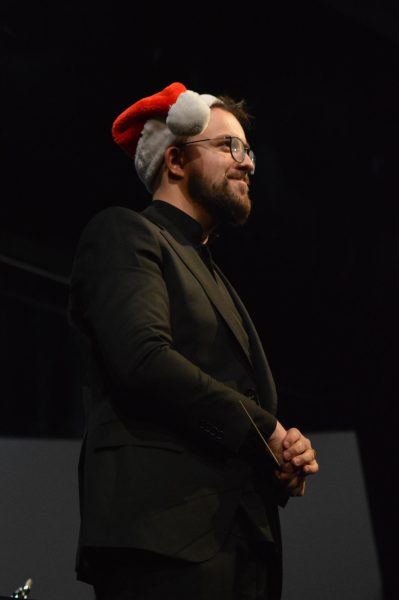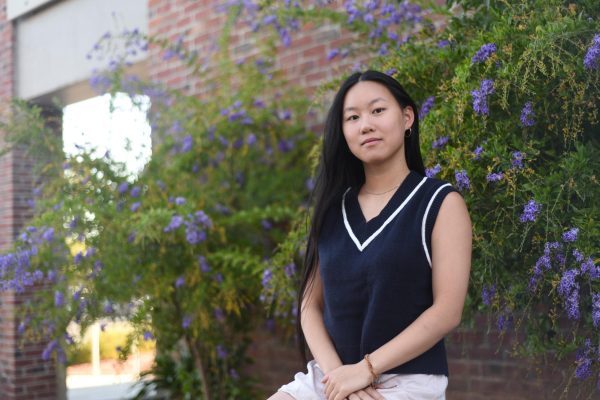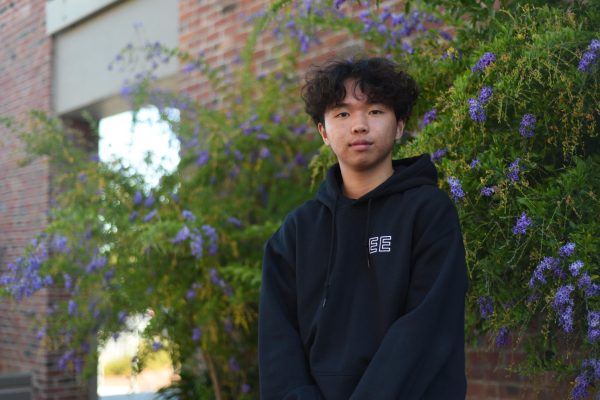
MVHS Instrumental Music Director John Gilchrist learned he had won the Richard L. Levin Orchestra Educator Award while traveling abroad in Japan over Thanksgiving break. He had been notified about his nomination for the prestigious award at the end of the previous school year but had never imagined he would actually receive it.
“I asked my wife to look at something on my phone, and that’s when she noticed that I had won,” Gilchrist said. “That was a huge shock to me because there are so many incredible orchestra educators in the state. It was just a really surprising and also deeply honoring experience.”
The Richard L. Levin Orchestra Educator Award is one of the California Music Educator Association’s (CMEA) many state awards serving to recognize excellence in the field of music education. Gilchrist will formally receive the award at the 2024 California All-State Music Education Conference (CASMEC) Awards Reception in Sacramento on Thursday, Feb. 1.
Gilchrist’s musical career began in elementary school when he started playing a drum set to back up his father, an amateur singer-songwriter. However, he doesn’t recall becoming truly interested in music until high school, when his marching band director inspired him to develop a deeper passion.
“I really found my high school director to be super engaging,” Gilchrist said. “Then I started exploring more with orchestral playing when I got into college. I had actually never even played with string musicians until I got to college. And that’s where I started to fall in love with the orchestra.”
Since then, Gilchrist says that his teaching style has been shaped by peers and mentors throughout his music career. In particular, Gilchrist was heavily influenced by his time as a student teacher at Homestead High School and Lynbrook High School under John Burn and Michael Pakaluk.
“I took basically what I would say are the best qualities of those teachers and tried to make it my own as much as possible,” Gilchrist said. “I also throw in a little bit from conductors that I’ve worked with in the past, that I’ve played under, and incorporate what I found engaging or entertaining about what they do.”
For instance, Gilchrist’s experiences with Burn and Ed Harris, the former director of the San José Wind Symphony, have led him to prioritize creating a fun, engaging, and welcoming environment within the MVHS orchestra program. Senior and chamber orchestra member William Zhang believes that Gilchrist’s clear passion for music education makes him well-suited to running the MVHS music program.
“He’s very welcoming for beginners in string orchestra and concert band,” Zhang said. “He has a lot of patience to listen to all of the mistakes they make and then suggest ways to correct them, and at the same time challenge the more advanced ensembles with more advanced music.”
Of the experiences that Gilchrist has provided for the orchestra program, Zhang’s favorite aspect is the tours they go on, where he and the rest of the orchestra gain invaluable experience and motivation to improve. During the 2022-23 school year, the MVHS chamber orchestra was accepted to the Midwest Clinic International Band and Orchestra Festival, a prestigious music conference held annually in Chicago. This year, the orchestra will be performing at Carnegie Hall in New York City.
 “Mr. Gilchrist was really excited about Midwest, and he was doing all the behind-the-scenes work that we were not conscious of,” Zhang said. “He likes to show us off. Like, ‘We went to this big convention, and this is how great the orchestra here is,’ and I think that’s something really admirable about him. It shows how deeply he cares for the orchestra.”
“Mr. Gilchrist was really excited about Midwest, and he was doing all the behind-the-scenes work that we were not conscious of,” Zhang said. “He likes to show us off. Like, ‘We went to this big convention, and this is how great the orchestra here is,’ and I think that’s something really admirable about him. It shows how deeply he cares for the orchestra.”
Trish Adams, the executive director of CMEA, likewise says that the educational opportunity Gilchrist provided MVHS students through a clinic like Midwest was exactly what CMEA looks for and hopes to support.
“We are looking for someone who is teaching well, integrating new methods into their classroom, and exposing their students to performance opportunities and high levels of music education,” Adams said. “In Mr. Gilchrist’s case, taking his students to the Midwest to perform last year was a huge honor. Being able to take them to someplace like the Midwest exposes the students to educational opportunities by travel, by performing in different venues, and just by the experience altogether.”
For hundreds of orchestras, the Midwest Clinic serves as a prestigious but far-off goal, yet attending had been on Gilchrist’s mind since he arrived at MVHS and began working with students here. After MVHS became one of only two orchestras from California to be accepted to perform, Gilchrist explains it was the proudest moment that he’s had as an educator.
“I saw there was so much incredible talent and raw potential at MVHS that had not fully been realized yet,” Gilchrist said. “Over the next two years, I thought about, with that inevitable goal in mind of performing at Midwest, ‘How can I get us from point A to point Z?’ To actually get in on our first time ever trying to apply was just amazing. For many, many music educators, that is the highest goal that they can achieve for their program, and it’s just really inspiring to me that the students were able to achieve that.”
However, being a part of the MV orchestra program isn’t all about far-away international tours or prestigious conferences. For Zhang, sometimes it’s the people closest to him that make the orchestra the program that it is. He enjoys helping and working together with fellow violinists, as well as the entire orchestra.
Gilchrist echoes the same feelings. For him, music depends on a tightwell-knit community, and as a result, he has incorporated new ways to help the MV orchestra — and the music program as a whole — bond with each other.
“Music is such a collaborative process,” Gilchrist said. “In a way, it kind of happens naturally. But there are all sorts of things that we do. This year, we started having receptions at the end of all of our concerts as a mini party. We’ve created a system of music houses that people get sorted into. I just think that things like that help them bridge out from not just their section, but even their ensemble.”
Ultimately, Gilchrist sees teaching music as simultaneously the most rewarding and challenging job anyone could have. Teachers have to be patient with the beginners, challenging with those who are more advanced, and avoid putting too much stress on students, all while maintaining a good sense of community within the ensemble. Adams believes that this is why it’s important to recognize the achievements of music educators.
 “Education is hard,” Adams said. “Teachers face many, many challenges, and it is important to encourage them throughout their careers. So CMEA has these awards, and many receive further recognition from their schools and their districts.”
“Education is hard,” Adams said. “Teachers face many, many challenges, and it is important to encourage them throughout their careers. So CMEA has these awards, and many receive further recognition from their schools and their districts.”
According to Adams, supporting music educators is especially important because more and more are choosing to leave the field. Research indicates that America has experienced a nationwide music teacher shortage since the 1980s, exacerbated by budget cuts and decreases in student participation.
Gilchrist also acknowledges that even among students who participate in music programs, the vast majority choose to pursue careers outside the arts, especially within the MVHS community. He hopes he has made an everlasting impact on the way his students perceive music.
“As much as I would love for everybody to be a music major when they graduate from Monta Vista, I know that’s not the reality,” Gilchrist said. “I just hope that when they leave the Monta Vista music program, even if they never play their instrument again, they go on to always listen to music differently and that I’ve influenced the way they interact with music at a foundational level.”











